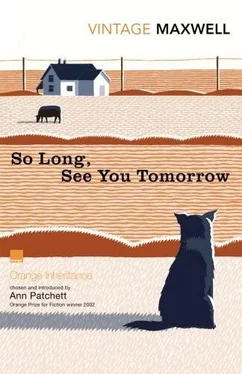Riding past on his bicycle, Cletus was conscious of the fact that Mrs. Wilson wasn't there — only that old woman. No more slices of bread that was still warm from the oven. If v he saw the little boys or Mr. Wilson he stopped to talk to them. Mr. Wilson acted as though everything was just the same. "Cletus," he said, "you're looking very spry this morning. Do you think we're in for some more rain?" But it wasn't the same, if he never came to their house any more the way he used to. And the Wilson girls weren't going to be at school to see him graduate from seventh grade.
Wayne had a basket of toys that he kept at Aunt Jenny's house, but instead of playing with them he followed her around all morning, talking her leg off-about what she had only a vague idea, for she was only half listening. Finally her patience gave way and she said, "Wayne, honey, be quiet a moment, I can't hear myself think!" And from the way he stood there, looking at her, she realized that he understood perfectly that she was half sick about what was happening out in the country and why his mother was unable to give him her undivided attention, the way she used to. "Not that it matters whether I do or don't hear myself think. You must forgive me, dear heart. I'm not responsible this morning. Now then," and she sat down in a rocking chair and gathered him on her lap and he put his head on her shoulder and they rocked.
After a while he said, "Aunt Jenny, what happens if— what happens if people wake up after they're buried and can't get out?"
"That couldn't happen. They're already in Heaven. And on the Resurrection Day their bodies and their souls are joined and they live happy ever after." Looking at him she could tell that he partly believed what she said and partly didn't believe it, having seen the crows picking at the carcasses of dead animals.
When his mother came to get him he gathered up his things and stood there waiting, but she said, "Run outside and play. Aunt Jenny and I have things to talk about."
The fairgrounds were deserted. The circus had gone ten days before, and it was too soon for the county fair. There was nothing to look at and nobody to talk to. When he got tired of waiting on the front steps he went back into the house and his mother made him go outdoors again.
It will wear itself out, Clarence said to himself, provided he was patient and didn't drive Fern to do something foolish.
He was patient, up to a point. For him, he was very patient. But she knew just where he drew the line, and, daring him, stepped over it. When he lost his temper he did things he could hardly believe afterward. Once when they were having an argument she screamed and Victor picked up a bucket of water and threw it over him. The shock brought him to his senses. He looked down and saw he had the poker in his hand.
What she did she did deliberately, and she never said she was sorry.
Somebody turned the wick of the lamp up too high and it made a fine layer of soot over everything. He expected her to burst into tears and start taking down the front-room curtains. Instead she laughed.
He asked her to go with him to see his parents and she refused. "But if you don't come they'll think we aren't getting along."
"Which is only the truth."
"They've had enough trouble in their lives. I don't want to add to it."
"You won't be," she said. "They know. Everybody knows. That's all people have to think about."
Since there was work to be done outside, he gave up and reached for his jacket.
All his socks had holes in them. The strawberry bed was loaded with fruit and she didn't bother to pick it. She left the beans on the vines until they were too big to eat. He no longer had a wife — only a prisoner.
Unwatered too long, the Christmas cactus in the front window died and ended up on the rubbish pile. When it was time for her plate of scraps the dog came and wolfed them down and then withdrew into her house. The cats followed Fern Smith around, purring as usual, and with their tails straight up in the air. Since they were neither faithful nor obedient themselves they saw no reason why women should be.
The widow knew that if she talked long enough at Fred Wilson he would have to lower the newspaper that hid his face and listen to her. Whether he wanted to or not. He heard about the habits of her late husband, and the hard life they had had — so much sickness, and losing the farm because they couldn't keep up payments on the mortgage, the younger son, her favorite, dead of a ruptured appendix, the older one who seldom came to see her because his wife made trouble if he did, and the daughter who lived too far away and never wrote except once in a great while, to say that things were not going well with them. In exchange for all this information which he did not particularly want, Fred Wilson felt obliged to tell her something, so he told her about his wife's lingering illness. "Poor thing," she said sympathetically. "But she's better off now. She's out of it at last."
When he said how grateful he was to his nephew for taking him in after she died, the widow said, "But wouldn't you be happier in your own home?"
"I loved my wife too much ever to remarry," he said firmly. He might not be able to read everybody's mind but he had no trouble reading hers.
The widow had other strings to her bow. One day she met Colonel Dowling in the Smiths' lane and he bowed to her and she never got over it. The social life that went on in her mind was vivid and kept her from being lonely. When Colonel Dowling said Mrs. B., would you care to take a spin in my car? she said No, thank you, or Well, since you insist, depending on her mood.
At Aunt Jenny's house, in a dresser drawer crammed with odds and ends of female clutter, there is an oval picture of her at the age of twenty-three. Every other picture of herself she has destroyed. She was never a beautiful woman but neither was she as plain as she imagined. When this picture was taken she was head over heels in love with Tom Evans, but for some reason love, even of the most ardent and soul-destroying kind, is never caught by the lens of the camera. One would almost think it didn't exist.
Downstairs, on a bracket shelf next to a vase with hand- painted pink roses on it, there is a matching picture of him, taken at the same time. His hair is roached and he is wearing a high stiff collar, and hardly anything shows in his face but his Welsh ancestry. His father and mother were rabid Methodists, but the rigid attitudes that they tried to hand down to him did not stand the test of experience and he ended up not believing in God. "I believe in paying your bills on time," he said, when he wanted to excite the pious. "And in common politeness."
He worked hard, because he liked to work, and was thrifty because he enjoyed that also. He worked for somebody else not because he had an ordinary mind but because the town wouldn't support a second plumbing business. Occasionally he treated himself to a glass of beer but the swinging doors of a saloon did not have an irresistible attraction for him. His fastidiousness could be explained easily enough by assuming that a nobleman's child and a commoner's had been switched in their cradles. But in Logan County there are no castles for the baby to be carried from in the middle of the night, and in fact no noblemen. So there must have been some other explanation.
He died in agony, of a gall-bladder attack, when he was in his early fifties, and the oval photograph, adapting itself to circumstances, is now clearly the photograph of a dead man.
He could not have loved Fern more if she had been his own daughter. To an outsider it seemed that Aunt Jenny was relegated to the position of waiting on them. Waiting on them was her whole pleasure, and she did not ask herself whether they valued her sufficiently. Or at all. Innocence is defined in dictionaries as freedom from guilt or sin, especially through lack of knowledge; purity of heart; blamelessness; guilelessness; artlessness; simplicity, etc. There is no aspect of the word that does not apply to her.
Читать дальше












